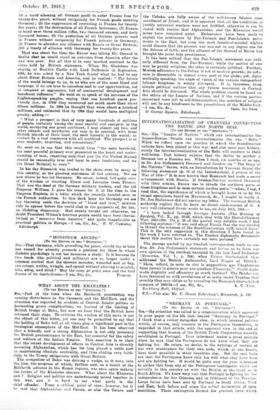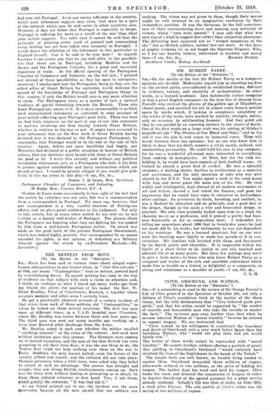" GERMANY IN PORTUGAL."
[To THE EDITOR OF THE " SPECTATOR.")
Sia,—My attention was called to a communication which appeared in your paper on the 5th inst. headed " Germany in Portugal." I think that a rather outspoken view, in which internal politics which, of course, only concern to the Portuguese themselves, is expanded in that article, with the apparent view in the end of supporting that branch of the British Trade Corporation recently established in PortugaL Your informant makes a great mistake when he says that the Portuguese do not know what they are fighting for. He refers, no doubt, to the writings of certain of our own countrymen for their own ends, which, as one knows, have their parallels in other countries also. But the real facts are that the Portuguese know only too well what they have been and are fighting for. It would be quite easy for your informant to gather this from any of the Portuguese contingents which are actually in this country or with the British at the front or in South Africa. We know very well that Portugal is fighting for her independence, for her Colonies, and in fulfilment of her Treaties. Large forces have been sent by Portugal to South Africa, West and Feat, both before and since the actual declaration of open hostilities. These contingents formed the greatest force which had ever left Portugal. As to any enemy influence in the country, which your informant suggests may exist, that must be a part of the network which may be said exists in other countries also. However, it does not follow that Portugal is especially to blame. Portugal is suffering far more as a result of the war than what your article suggests. You refer that it cannot be said that the principle of planting every yard of ground and economizing every shilling has yet been taken very seriously in Portugal. I would direct the attention of the informant in this particular to England herself. Can it be said to be true here ? As regards business I can assure you that we are well alive to the possibili- ties that there are in Portugal, including Madeira and the Acores and the Portuguese Colonies, for a great and successful expansion of trade. At the official opening of the Portuguese Chamber of Commerce and Industry, on the 3rd inst., I pointed out several of those possibilities as they lay open to enterprise; moreover, I emphasized how the Portuguese, being as they are, the eldest allies of Great Britain for centuries, would welcome the spread of the knowledge of Portugal and Portuguese things in this country if only the British would care to pay more attention to them. The Portuguese have, as a matter of fact, a natural tendency of special friendship towards the British. Those who know Portugal are aware of it. It is most unreasonable to publish such unwarranted statements as contained in some passages' of your article reflecting upon Portugal's good faith. There has been no bad faith whatever on the part of any of our late statesmen in matters involving our firm loyalty towards Great Britain, whether in relation to the war or not. It might have occurred to your informant that on the first week of Great Britain having declared war it was declared in the Portuguese Parliament, by unanimity, that Portugal would be to the end at the side of this country. Again, before our open hostilities had begun, our Ministers had declared at a public reception in honour of British sailors, that our destinies were bound with those of Great Britain for geed or ill. I write this entirely and without any political inclination whatsoever, only as a Portuguese who feels it his duty to protest against uncalled-for and hasty insinuations which are devoid of fact. I would be greatly obliged if you would give pub- licity to this my letter in fair play.—I am, Sir, &c.,
20 Budge Row, Cannon Street, B.C. 4.
[Senhor de Lears seems occasionally to lose sight of the fact that the article he criticizes was not ours, but was a communication from a correspondent in Portugal. We must say, however, that our correspondent is a very careful observer of Portuguese affairs, and we place great confidence in his judgment. Not only in this article, but in every other article he has sent us, he has written as a hearty well-wisher of Portugal. The phrase about the Portuguese not knowing what they are fighting for was quoted by him from a well-known Portuguese •writer. No attack was made on the good faith of the present Portuguese Government, which was indeed highly praised. Our correspondent by no means exceeded his rights, in our opinion, in defending our Military Attaché against the attack by ex-President Machado.—En. Spectator.]



































 Previous page
Previous page